School District of Collier County
DATA-DRIVEN CONTINUOUS IMPROVEMENT:
Regular use of data and a focus on continuous improvement
Promising Practice:
Data Dialogues: Data-Driven Instructional Leadership
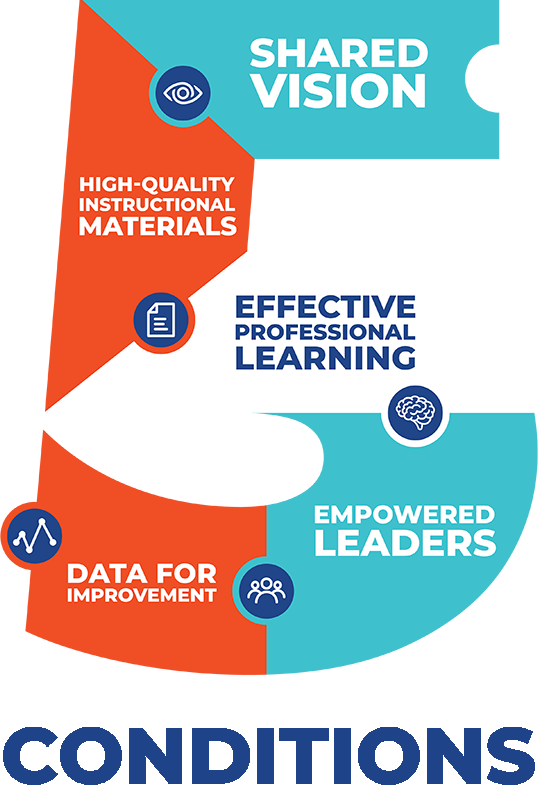
Our goal for this series of Cases for Impact is to provide education leaders and teachers with knowledge and resources needed to ensure that great teaching and learning is consistently realized in all Florida schools. We believe that if education leaders are empowered to know how to recognize, support, and scale excellent teaching practices, we will see tangible results in the classroom.
In partnership with the Florida Association of District School Superintendents (FADSS), Impact Florida launched the Districts for Impact initiative in 2019 to support superintendents’ focus on supporting excellent instruction within their systems, for all kids. This series of Cases for Impact highlights the promising practices gleaned from the inaugural cadre of five Florida districts.
While we recognize that there are many conditions that factor into a student’s ultimate success, Impact Florida focuses on those factors leaders and educators can control in their classrooms to improve student engagement and learning. We call these factors the Five Conditions That Support Great Teaching.
This Case for Impact Profile deconstructs how Collier County Public Schools (CCPS) leverages data for continuous improvement through its Data Dialogue process.
A New Vision for Leveraging Data
In 2011, Dr. Kamela Patton was appointed superintendent of CCPS, and she led the development of a multi-year strategic plan designed to strengthen existing systems and data analysis practices. She brought with her a powerful data-centered practice that she had previously implemented as Assistant Superintendent of Miami-Dade County Public Schools. Dr. Patton sought to translate Collier County’s school improvement goals into practice through Data Dialogues, a series of targeted student-data conversations led by principals and other school leaders. The district began implementing Data Dialogues based on the following theory of action:
IF
- the District establishes a formal system to collect, analyze and report a wide range of data; and
- school leaders regularly reflect with peers and district leadership on successes and opportunities for improvement; and
- teachers use the data to plan and implement instructional adjustments,
THEN
- ALL students across the district will experience equitable, high-quality educational opportunities to be College, Career and Life Ready; and
- the District will be recognized as an Academically High-Performing District.
When Dr. Patton arrived, CCPS had no comprehensive systems in place for school leaders to collaborate, analyze, or compare data beyond state assessments. Though principals shared curriculum guides, there was no way to ensure that leaders had the opportunity or capacity to digest and implement innovative practices. Additionally, the professional learning community (PLC) model for professional development was a relatively new practice in schools across the district. Thus, performance varied widely across the district and systems were not aligned.

ABOUT COLLIER COUNTY PUBLIC SCHOOLS (SY 2019-20)
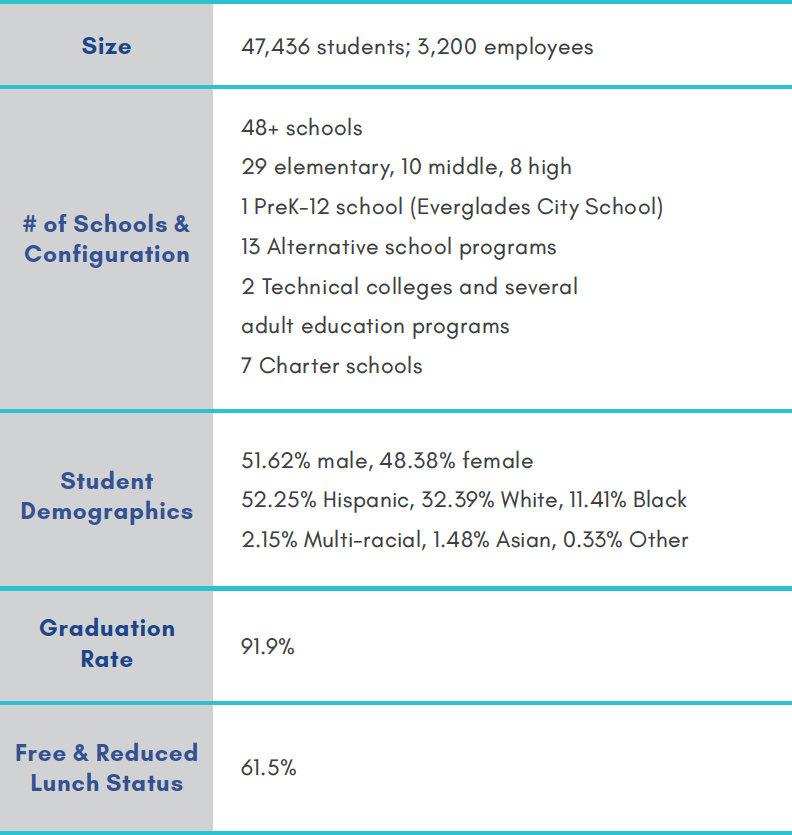
CCPS’ Promising Practice: Data Dialogues Foster Instructional Leadership
In 2011, CCPS began gathering school and district leaders in August, October, and January, for a half-day Data Dialogue session. At the time Data Dialogues were introduced, the district was ranked 33rd of 67 districts, under the State of Florida’s accountability report card system. In 2012, an AdvancEd accreditation finding confirmed their sense that CCPS needed to establish a more systematic approach to instructional leadership and create thoughtful alignment between schools.
District leaders saw the Data Dialogue as an opportunity to do this; steadying the path for schools to grow cohesively by collaboratively analyzing data (including state and district quarterly benchmark assessments and ESSA data), and sharing best practices, challenges, and achievements. The Data Dialogue process became an important tool to break down the walls between school buildings to develop a Professional Learning Community (PLC) culture across schools, provide more targeted support for individual students and underserved populations, and prepare the pipeline of the next generation of school administrators.
During the Data Dialogue preparation, school teams dive deep into their data to address each component of the protocol outlined in advance.
“We have always had a strong focus on student achievement, but with the strategic use of the data through Data Dialogues we have been able to focus on the progress and needs of every individual student. Now, we can quickly identify students who may need additional interventions, track progress towards graduation, and more.”
- Dr. Kamela Patton, CCPS Superintendent
The protocol guides school leaders through an assessment of student performance, learning conditions, the appropriateness of grade-level assignments, the rigor of coursework, and how students are engaged socially and academically.
Additionally, CCPS began to place a new emphasis on non- academic measures such as social and emotional learning (SEL) data, teacher absences, new teacher support systems, and school retention efforts, with a focus on serving the whole child (Fig. 1). Today, only four of the seven sections of the Data Dialogue protocol address academics.
FIG. 1 | EVOLUTION OF CCPS DATA DIALOGUE PROTOCOLS
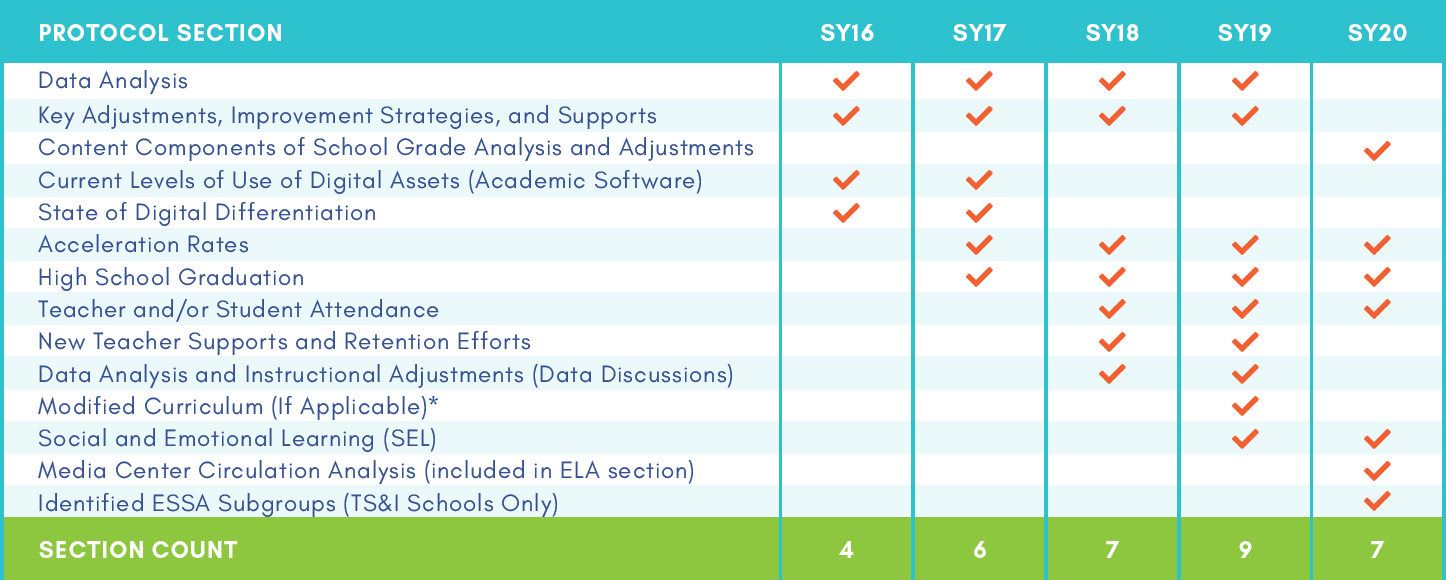
Lessons Learned
Initially, many school leaders found the process intimidating due to the high level of accountability and a hyperfocus on academic achievement. Each Data Dialogue was structured as a fishbowl; a speaker-centered format where participants surround the presenters as observers of the process.
Since then, CCPS has continued to improve and adapt the Data Dialogue process to best meet the emerging and changing needs of students, teachers; and administrators. The meetings are now clustered by grade band - elementary, middle, and high school. In lieu of the fishbowl seating arrangement, the session is now organized in discussion groups and schools are encouraged to present a problem of practice they are facing that other schools could collaboratively help them solve in real-time.
In 2017, an AdvancEd Accreditation Assessment commended the Data Dialogue process as a powerful practice. AdvancEd commended the process because it allows the district to do more than just look at data, it is focused on understanding the data to drive decision- making and improvement around staffing, instruction, professional learning, funding, resources, equity, etc. In the assessment, AdvancEd suggested the district scale the data-driven approach to schools to empower teachers with a similar level of data analysis and action as an opportunity for growth.
Taking Data Dialogues to the School Level
Now in its ninth year of implementing Data Dialogues, the district is focused on implementing the process at the school level to establish a clear vision for school- wide data use and to scale impact even further.
At schools, Data Dialogues help teachers examine their own data and set strategic learning goals with students. CCPS is currently partnering with TNTP to conduct academic diagnostics in classrooms to help further this initiative and to ensure equitable access to rigorous coursework.
“By aligning our efforts in one direction through the Data Dialogue process, we now are working smarter for students, for teachers, for parents, for the community. The process enables us to provide targeted support to ensure that upon graduation, each student has a clear pathway to college, university, into the workplace, or technical school.”
- Dr. Peggy Aune, CCPS Associate Superintendent, Teaching and Learning
Student-Centered Support
The Data Dialogue process has enabled the district to track patterns and trends for each student as they matriculate from ninth to twelfth grade in order to ensure that students are in the right courses, on track for graduation, and have access to accelerated courses and the appropriate supports. The district has created a data-rich culture by giving instructional leaders and community partners access to a comprehensive student information database to improve targeted support for students academically and beyond.
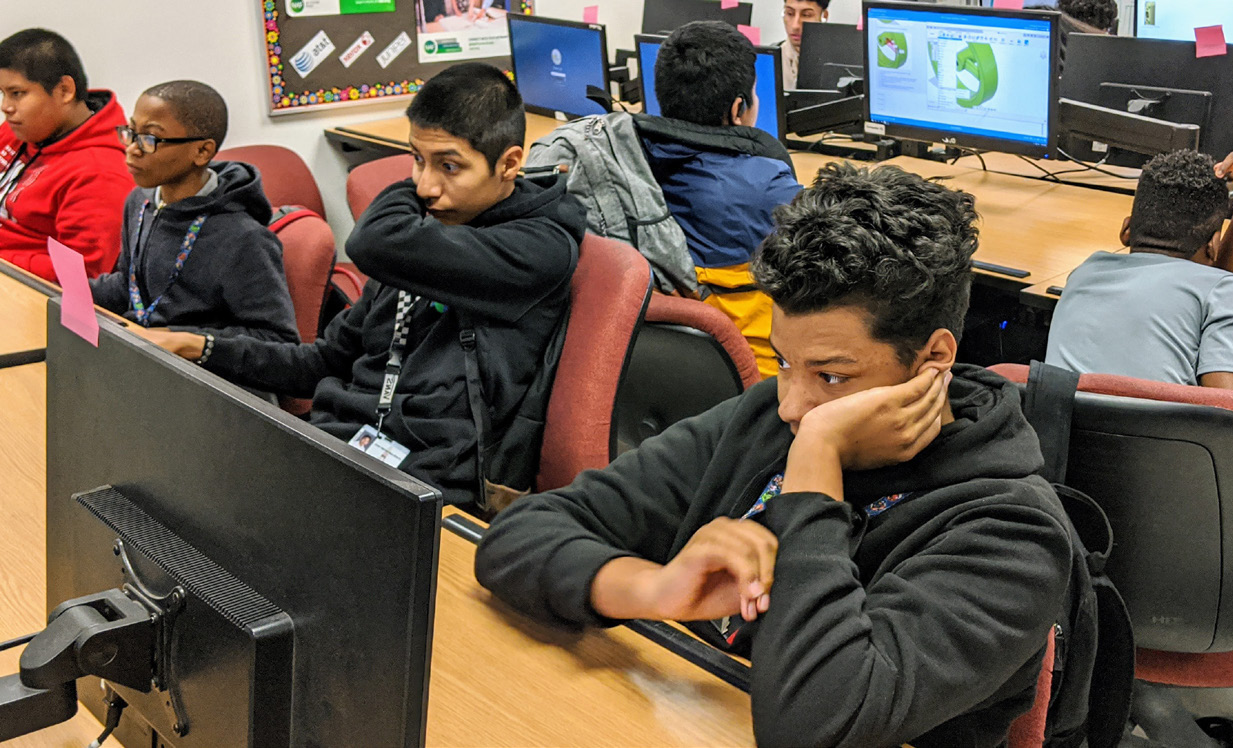
Academic Vital Statistics (AVS)
AVS takes school-level implementation even further. AVS was developed by Immokalee Middle School to address a disproportionate number of core course failures and low English Language Arts (ELA) and math proficiency rates by empowering students to take ownership of their own data.
Each week, students spend time in each core course to review their AVS data binder and set short-term goals for themselves. The AVS data binder gives students regular, tangible data about their daily attendance, current grades, and current missing assignments. Since implementing this process, Immokalee Middle School has increased attendance rates, learning gains, and proficiency rates in ELA and math. The school has also decreased course failures resulting in summer school and built confidence and self-efficacy in students.
Throughout the development and implementation of this process, Immokalee Middle School shared progress updates and proof points with peers during the Data Dialogue. All CCPS middle schools have now adopted the AVS model from what they learned through the Data Dialogue. This is just one example of how the district leverages the process to scale improvement.
A Focus on Equity
Further, the district has been leveraging the Data Dialogue process to address equity gaps by identifying and alleviating barriers for historically underserved students. As part of this work, the district was deliberate in developing an equity definition to ensure there is consistency and alignment across the district and with community partners. CCPS leaders believe their commitment to equity is reflected in how well they support students and staff based on individual needs. Their equity definition states that CCPS:
- Strives to ensure all students reach their full potential while considering social, emotional, and personal circumstances;
- Prioritizes an inclusive environment where children have access to rigorous grade-level standards, instructional materials/learning platforms, content and challenging curriculum regardless of background;
- Allocates equitable school funding and ensures schools serving populations with greater needs have access to additional resources;
- Provides well-maintained facilities and access to technology resources for all; and
- Aspires to place high-quality, culturally competent staff in every classroom to ensure the unique needs of children are met.
Strategic Scheduling for Equitable Acceleration
School and district leaders discovered that students from underserved populations often did not receive opportunities for acceleration due to course load minimums and scheduling algorithms. Through the Data Dialogue process, school leaders were better able to leverage student data and teacher recommendations to determine when it was appropriate to disregard scheduling algorithms, allowing for a more student- centered scheduling process. Since implementing strategic scheduling in 2016, middle school acceleration has grown from 53% to 84%, a 58.5% increase.
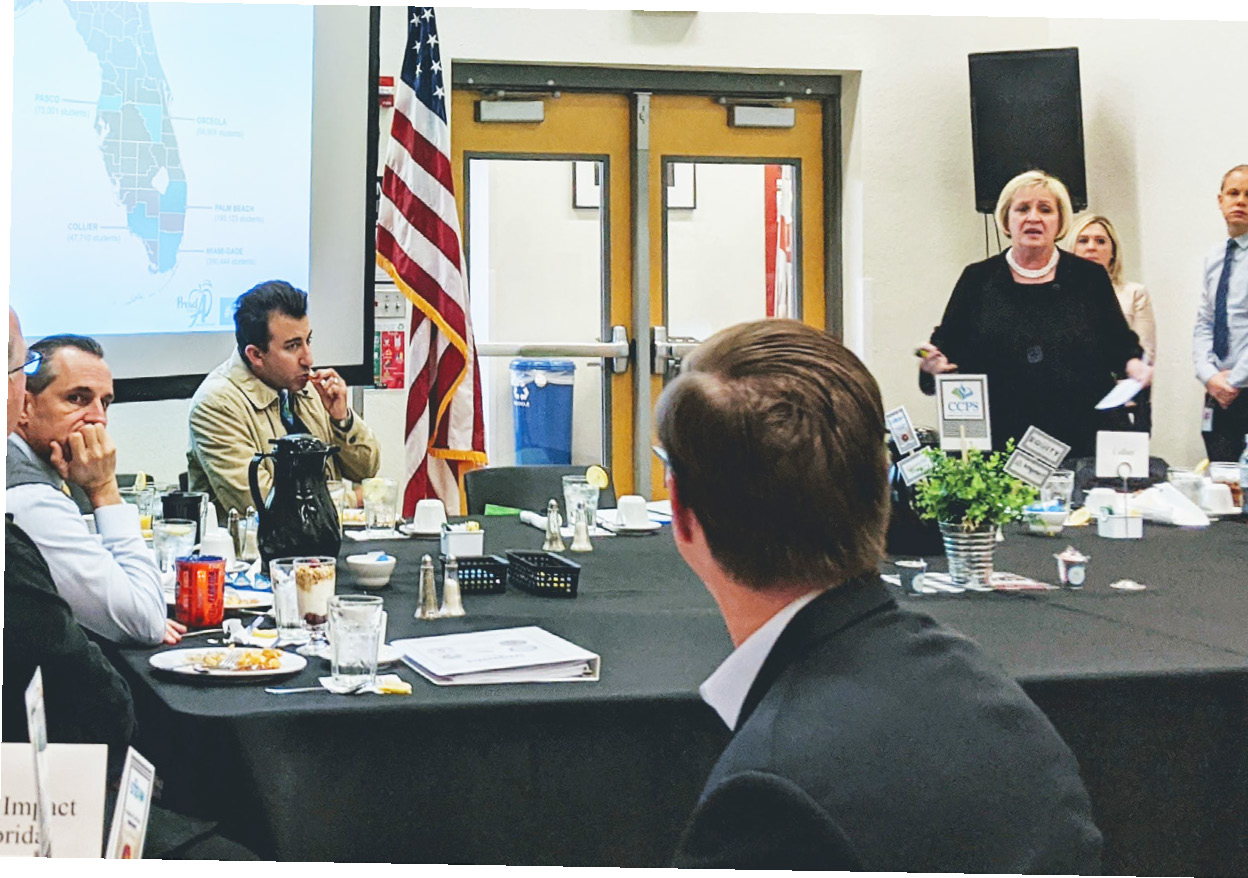
Impact Proof Points
Since implementing the Data Dialogue process, the district has outperformed the state average in 19 out of 21 (90%) tested areas, compared to 6 out of 20 (30%) in 2011, and has become one of the highest-rated districts in Florida (Fig. 2).
Today, Data Dialogues are a foundational element of the district’s data culture and efforts to support student achievement. CCPS will continue leveraging and improving their Data Dialogue process with a focus of bringing the data to the classroom level.
FIG. 2 | 2019 STATE ACCOUNTABILITY CCPS HIGHLIGHTS
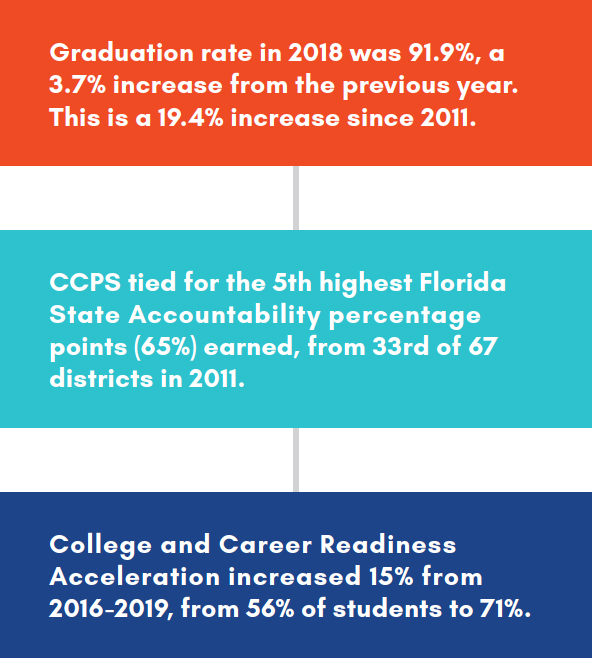
Looking Ahead
Drawing inspiration from learnings from Impact Florida’s Districts for Impact model, CCPS has launched its own version of the cadre experience. Schools for Instructional Impact was implemented at the school level, in partnership with Champions for Learning, the local education foundation.
The work is funded by a grant from the Consortium of Florida Education Foundations and was piloted at four elementary schools, with the aim of increasing the instructional impact of teachers. School leaders, instructional coaches, and resource teachers visited each other’s schools to examine instructional practices using the same shared consultancy model as Districts for Impact. This project was highlighted at a recent community roundtable hosted by Champions for Learning, and learnings from the pilot will be utilized to scale instructional impact across the district. One participating principal shared, “Thank you, thank you, thank you. What an amazing experience this has been. All four schools had wonderful and unique ways to meet the needs of their students. Hoping to have another opportunity to visit other schools.”
The Purpose of a Process: The Collier Perspective on Data in a Pandemic
With the statewide move to distance learning in the spring of 2020 as a result of the coronavirus pandemic, came the state’s suspension of statewide summative assessments for SY 19-20. While this was a welcome respite for schools and districts already challenged with building and executing Instructional Continuity Plans on top of a public health crisis, it left Florida districts without the student outcome data so critical to executing decisions around promotion, student supports and scheduling for the summer and the forthcoming SY 20-21.
In a district like Collier, with established data processes and tight protocols for examining and utilizing summative student outcome data, this was both cause for concern but also, an unexpected opportunity to reflect on the value of the data and processes CCPS has in place.
“CCPS has a strong history of using data to drive instruction and make timely adjustments to maximize student achievement. So in the spring, when we learned we would have no FSA data, I had leaders saying, ‘What are next steps without this data? How will this impact student scheduling and our school improvement plan goals?’” Superintendent Kamela Patton noted. “But we realized, because of our strong district processes — our Data Warehouse, our benchmark assessments, our Data Dialogue process that connects and analyzes critical student data points — we know where our students are and where we need to be. We had the ‘a ha’ that we don’t just need to rely on state assessments; we have had our check-ups all along.”
CCPS quickly moved to innovate new ways to measure what they knew was the unknown variable: every students’ individual circumstance as they entered the summer and SY 20-21. They also knew this qualitative data about their educators would be critical as well. CCPS leaders increased the social-emotional qualitative data they collected through student and teacher surveys and built “eLearns profiles” that included teacher self-reflections, administrator-identified exemplary practices and grading/attendance data to inform staffing decisions and preferences for new instructional models.
Without state-level student outcome data, the district has also innovated ways of utilizing their own benchmark progress monitoring tools to guide instruction in real-time. CCPS has also decided to use the School Improvement Planning (SIP) process to further understand the root causes behind the data tackled in the district’s Data Dialogue process.
“A positive unintended consequence of not having the state-level summative data has been that we are reflecting much deeper on the data we have,” said Dr. Peggy Aune, Associate Superintendent, Teaching and Learning. “CCPS’ involvement in the Impact Florida Five Conditions Cadre definitely bolstered the innovations we’ve tackled under COVID-19. We had observed strong SIP processes in Osceola County and like-minded work in Pasco County that gave us exemplars to consider and colleagues at the ready to help us think through how we would fold specific processes into our work in CCPS.”
As it enters SY 20-21, CCPS leadership is turning their learnings from COVID-19 into new ways of work and support for school leaders. Collier is one of the four districts now working with Impact Florida in a COVID Recovery Cadre that is focusing on student-level academic interventions and social-emotional supports.
“We are eager to learn how we can best support students and families as the curators of the student education experience that best meets their needs during this time of COVID-19 and beyond,” Superintendent Patton noted. “Likewise, we are proud to share what we have learned about the value of regular processes to collect and make meaning of student-level data. It is more important than ever as we seek to create a path to success for every student CCPS serves.”
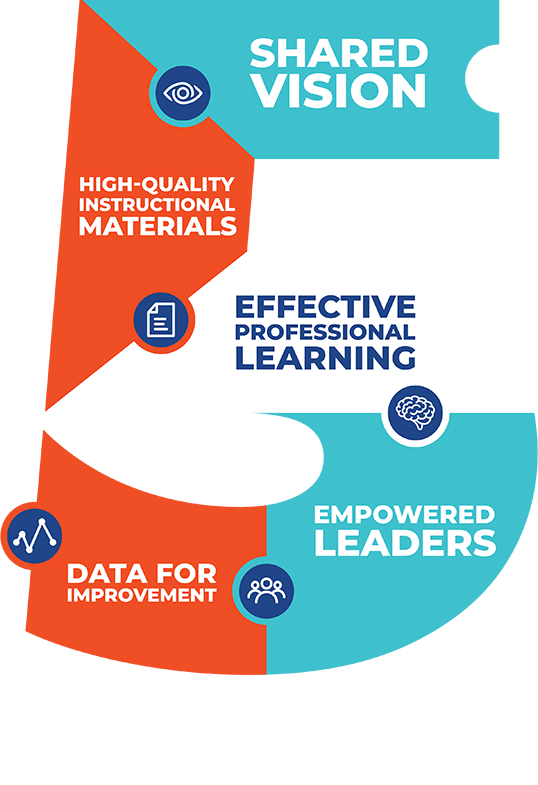
Reflection Questions
- What evidence of the Five Conditions That Support Great Teaching do you see in this case for impact?
- Do processes exist within your school or district that leverage the regular use of data for the purpose of continuous improvement?
- f so, what are they, and how does your school or district ensure the process is implemented with fidelity?
- If not, what aspects of this Case for Impact could you use as a guide to get started?
- How has your district adjusted how it collects, makes meaning and responds to your student- level data, in order to best support students, as a result of COVID-19?
- In what ways might you envision using the Data Dialogue process to deliberately help close gaps between students with disabilities and those without, or between native English speakers and English-language learners?
